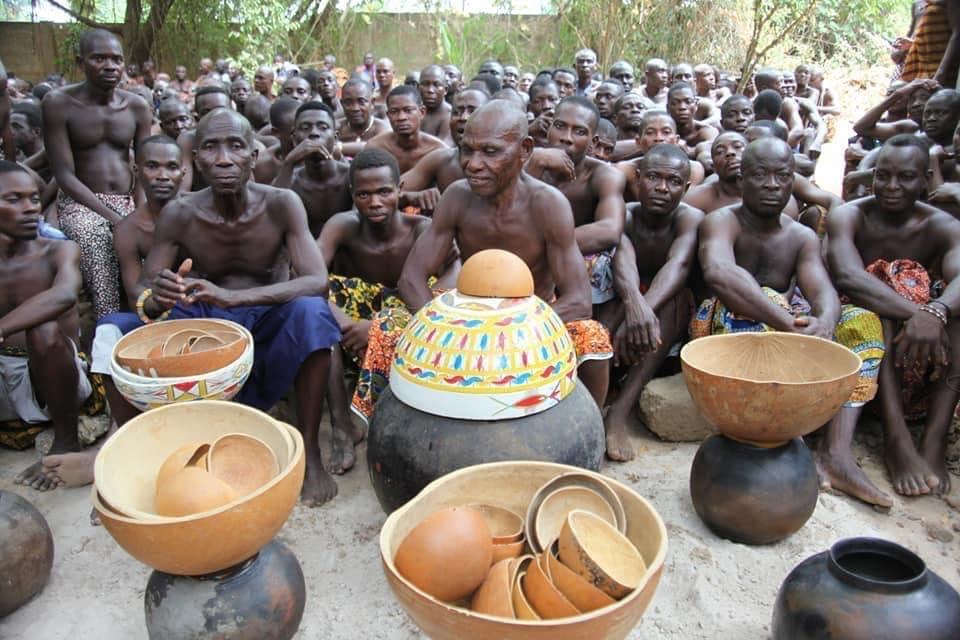Firstly, this research was conducted with the permission of the Ketu-North and Ketu-South Health Directorates, the Klikor Health Center in charge, Dr. Gbadago, and his team of hardworking nurses, district and municipal School Health officers, CHRAJ representatives, NGOs, civil society organizations, the Ghana Police of Agbozume, and traditional leaders—especially Torgbui Addo of the Klikor Traditional Area. These authorities facilitated free and smooth access for data collection without any intimation or struggle, providing guidance, access to communities, and logistical support that ensured the research proceeded efficiently and authentically.
Secondly, special acknowledgment is extended to my supervisors—Prof. Paul Aryee, Dr. Mahama Saaka, and Mrs. Helen Gatsi—for their expert guidance, constructive feedback, and mentorship throughout the project. Their support was instrumental in shaping the research design, methodology, and analysis, ensuring that the study met rigorous academic standards.
Against this backdrop, it is important to address the widespread misconception that children born to shrine mothers are inherently disadvantaged. Evidence gathered during this study shows that their health, nutrition, and access to care are comparable to children from non-shrine communities. Yet, Trokosi and Fiasidi practices continue to be misunderstood, often portrayed negatively in public discourse, which raises questions about cultural perception, stigma, and policy neglect.
To better understand these practices, it is necessary to first clarify terminology. Fiasidi, in Ewe, refers to a young woman dedicated in marriage to a shrine priest, while Trokosi describes girls dedicated to a deity under the priest’s care. Children of shrine women often receive traditional names such as Klu, Klutse, Klufui, Koshie, or Koshiefui, preserving cultural identity and heritage.
Moreover, those stereotyping the entire practice as evil or, for that matter, demonic, have forgotten that dedication to spiritual practices is not unique to shrine culture. Biblical and historical examples demonstrate that vows of dedication exist across societies. For instance:
Hannah dedicated her son Samuel to God (1 Samuel 1:11, 1:24–28).
Jacob promised a tenth of his possessions at Bethel (Genesis 28:20–22).
Jephthah offered the first outcome of his house to God (Judges 11:30–31).
Nazarites voluntarily dedicated themselves for a period of service (Numbers 6:1–21).
Mary and Joseph presented Jesus at the temple (Luke 2:22–24).
Levites were set apart for service (Numbers 8:5–22).
Samuel served in the temple from childhood (1 Samuel 2:18–21).
The firstborn were consecrated to God (Exodus 13:1–2).
These examples collectively illustrate that dedication—whether of a child, person, or possessions—is a universal practice emphasizing commitment, accountability, and promise-keeping.
In terms of research, a study assessed 600 participants—300 shrine mothers and children, and 300 non-shrine participants—using questionnaires, focus groups, anthropometric and biochemical tests, dietary recalls, and immunization assessments. The findings confirmed that shrine children are healthy and thriving: immunization coverage was 87% versus 91% for non-shrine children, stunting 19% versus 21%, wasting 7% versus 8%, exclusive breastfeeding 62% versus 64%, and hemoglobin levels averaged 11.1 g/dl versus 11.3 g/dl.
Nevertheless, shrine communities continue to face stigma and neglect. Hard questions emerge: Why are shrine communities systematically bypassed by NGOs and health outreach programs? Why are they labeled as “less important” or “demonic”? What wrongdoing have they committed to deserve such isolation? Is fear of the unknown stronger than evidence of well-being? Do we unconsciously judge a community because it challenges our moral or religious comfort zones? How many lives and potential contributions are lost because we cling to stereotypes? Are we complicit in injustice simply by ignoring them? Does the majority’s belief give them the right to marginalize the minority?
Ghana is a secular state with a constitution that guarantees freedom of thought, conscience, and religion. Article 21(1)(c) of the 1992 Constitution explicitly protects the right to practice any religion of choice. In a country with diverse religious practices, the number of followers of a religion does not make it more powerful or legitimate than others. Neglecting shrine communities is not only a moral and social oversight—it contradicts constitutional principles of equality, religious freedom, and human dignity.
Importantly, field visits revealed positive realities of shrine life. Women access education and healthcare, run local businesses, and children are well-fed, immunized, and developmentally on par with peers. Shrines also function as cultural, social, and spiritual support centers, challenging stereotypes of helplessness and exploitation. Observations confirm that shrine women are empowered and actively contribute to their communities economically, socially, and culturally.
Firstly, inclusive health programs must be implemented to integrate shrine communities into national health initiatives. This includes immunization drives, nutrition programs, and regular mobile clinic outreach to remote areas, ensuring that shrine children and mothers receive equitable healthcare.
Secondly, cultural sensitivity training for health workers is essential. Workshops and training modules should be conducted for health professionals and NGO staff to ensure respectful and culturally aware engagement with shrine leaders and communities. This will reduce stigma and promote trust between health providers and shrine populations.
In addition, public awareness campaigns should be launched utilizing radio, TV, and social media platforms. These campaigns can challenge stereotypes, highlight positive stories, and educate the general public about shrine communities, fostering social acceptance and understanding.
Furthermore, legal and human rights safeguards must be strengthened. Laws prohibiting harmful practices should be enforced while respecting constitutional freedoms. Collaboration with local traditional councils will help monitor compliance and protect shrine women and children effectively.
Equally important, education and vocational empowerment initiatives should be promoted. Scholarships, literacy programs, vocational training, and leadership opportunities for shrine women will enhance their socio-economic independence and encourage participation in community development projects.
Moreover, nutrition and child development support programs should be implemented. Community-based interventions focusing on child nutrition, early development, and maternal education on breastfeeding, hygiene, and childcare practices will ensure that shrine children thrive physically and mentally.
Finally, continuous research and monitoring are necessary. Periodic assessments of health, nutrition, and social well-being in shrine communities will track child health indicators and inform policies, resource allocation, and program improvements effectively.
In conclusion, shrine communities in the Volta Region are thriving despite misconceptions. Children born to shrine mothers are healthy, well-nourished, and developmentally on par with peers. Public health authorities, NGOs, religious institutions, and policymakers must respect cultural practices, provide equitable health services, and separate myths from reality. Ghana’s secular and multi-religious framework demands that no religion be deemed superior; equality and inclusion must guide all interventions. Inclusive and culturally aware development is essential for national progress.
By Curtice Dumevor, Public Health Expert & Social Analyst
Email: curticedumevor25@gmail.com




































